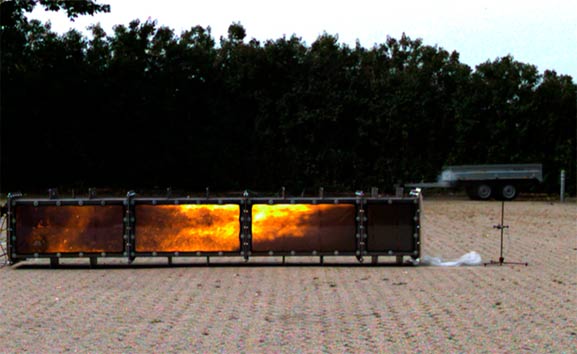Safety isn't an add-on – it's the entry ticket
Without safety:
• no green transition
• no trust in innovation
• no secure supply

Without safety:
• no green transition
• no trust in innovation
• no secure supply
Why Europe must invest in open, neutral safety infrastructures
Europe’s next growth wave depends on the safe deployment of green and digital technologies. This is the mission of the new European Strategy on Research and Technology Infrastructures.
From hydrogen and methanol to batteries and electrification, Europe is embracing transformative technologies, each bringing new risks that must be managed before they can be trusted and scaled.
Without independent testing, training, and neutral infrastructures, neither citizens, regulators, nor markets can fully embrace the technologies that Europe needs to succeed.
The challenge: Gaps in safety evidence
Today, Europe’s test facilities remain too limited in scale. Most laboratories can only run small, controlled experiments that fail to capture the real risks of complex systems: tunnels, ferries, underground parking garages, and refuelling hubs.
This gap – the lack of large-scale testing facilities – has serious consequences:
DBI’s suggested way forward
DBI - The Danish Institute of Fire and Security Technology is an independent, non-profit Research & Technology Organisation with a public mission. DBI operates several testing facilities, although most lack the scale required to demonstrate safety under realistic conditions.
DBI proposes that the EU co-fund a network of open, large-scale test and training infrastructures under the new Research and Technology Infrastructure strategy—using GBER Art. 26/26a and SGEI frameworks to allow up to 100 % public funding of non-economic activities. These infrastructures should:
Safety is the entry ticket
Europe must treat safety as strategic infrastructure. By investing in world-class, open safety facilities, the EU can accelerate its green transition, strengthen competitiveness, and safeguard supply security. DBI stands ready to contribute evidence, facilities, and expertise.
Safety is not optional. It is the foundation of Europe’s future.
Download DBI's policy paper "Safety is the entry ticket"
DBI's response to the European Commission’s Call for Evidence on the General Revision of GBER (Regulation (EU) No 651/2014)
DBI's response supports the GBER review to simplify compatibility conditions and reduce administrative burdens while preserving competition. DBI proposes eight changes, ordered by DG COMP priorities:
Download REVISION OF THE GENERAL BLOCK EXEMPTION REGULATION (GBER) - DBI's Response to the European Commission’s Call for Evidence on the General Revision of GBER (Regulation (EU) No 651/2014)